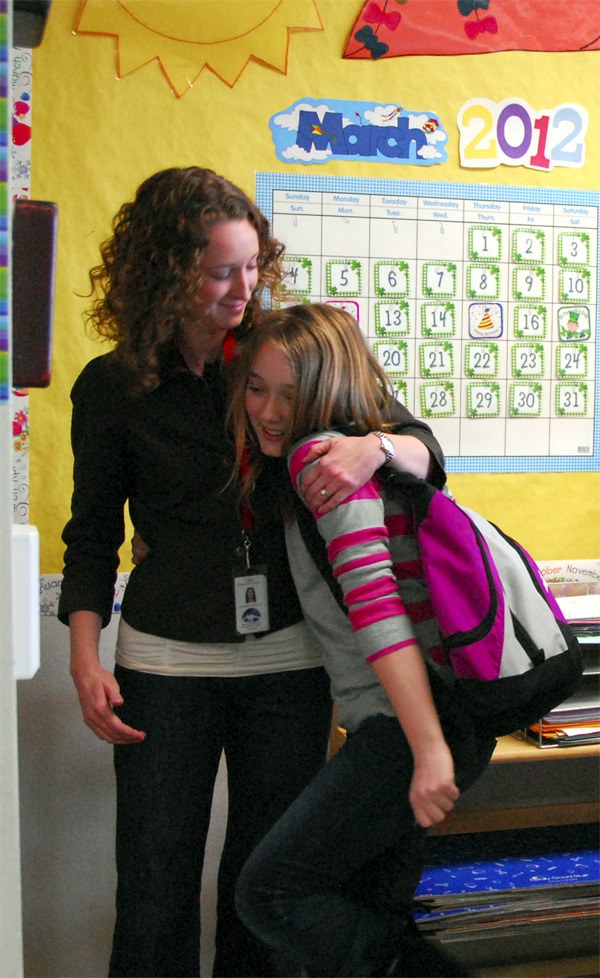Cake, balloons, and a video camera coming through her classroom door were enough to make fourth-grade teacher Elizabeth Cronin pause a beat, but not enough to throw her off the day’s subject matter.
“Do crayfish like cake?” she asked her excited students at Cascade View Elementary School.
They had to think for a moment, then agreed that no, crayfish probably didn’t eat much cake.
They all had cake though, with members of the Snoqualmie Valley Schools Foundation, who surprised Cronin with the announcement that she’d been selected their 2012 Elementary Educator of the Year.
The kids also got the thrill of being interviewed on-camera for a video to be shown at Thursday’s Schools Foundation luncheon.
“This is so awesome!” one girl squealed, clasping hands with a friend.
Awesome, yes; educational, maybe not in a strict sense, but Cronin found a teaching opportunity in the experience, (“I was just making sure that we got science in,” she said) and the memorable event probably helped support her main teaching goal.
“I tell my kids, ‘I want you to want to learn,'” she said, a few days after the excitement.
She’d just said good-bye to her class for the day, getting (and giving) a hug, a handshake, or a high-five from each one of them, as their required “exit pass.”
“It’s just my way of connecting with kids before they leave, having some positive interaction with them,” Cronin explained, going on to list a couple of the secret handshakes her students have created to share with her.
That individual interaction is so important, Cronin says, and it can be so difficult to achieve every day with 23 to 27 students in a room. She makes sure to celebrate their successes in the classroom, and really appreciates the parents and volunteers that “will do anything and everything,” for her class.
Earlier in the day, a parent was helping one of her students with fractions while the majority of the class worked on the big milestone of long division. A few days before that, another parent sat down with a student who needed help with his reading skills, allowing Cronin to focus on a different subject.
“That someone is willing to come in, take time out of their busy schedule, and read with a kid, is amazing,” she said. Having that extra help is invaluable. “It changes your teaching.”
Cronin has known for a long time that she was going to be a teacher.
“My mom is a teacher, and I just assumed that I would teach when I grew up,” she said.
Her students, though, were always going to be younger than her mom’s ninth graders.
“I have always loved kids, even when I was a kid,” she said, “I loved being around kids younger than me.”
Although she’s taught, and enjoyed teaching several grades, and actually started as a third-grade teacher in the district at Snoqualmie Elementary School, Cronin especially enjoys teaching the fourth grade.
“They are a little more capable at this age. They’re eager to learn, and … between third and fourth grade, here’s a shift in responsibility,” she said. “They’ll do things without it being an assignment, because they’re interested in it.”
This year’s class is particularly special to her, she says, for their empathy and kindness, too. They lost a beloved classmate in January, a girl who felt lucky just to be at school, and whose gratitude affected her whole outlook on life. Her death affected them all deeply, as well as Cronin, who had an additional burden.
“As a teacher, you have to be able to help each child move on from that grief,” she said.
With a classroom exercise based on the book “The Invisible String” by Patrice Karst, she illustrated for her students how they could honor and remember their friend. They each in turn passed a string to one of their friends, creating a web in the classroom, representing their connections to each other and their classmate.
It’s a lesson Cronin has learned well, but she already knew it.
“You need to make each and every one of them feel special,” she said.



